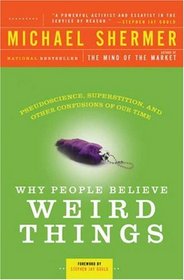Marc S. (evlcgul) reviewed Why People Believe Weird Things: Pseudoscience, Superstition, and Other Confusions of Our Time on + 5 more book reviews
Helpful Score: 2
This book opens your eyes to so much that is going on around us. It covers everything from Alien Abductees to the Holocaust to Creantionists. You will disagree with the author's views on several issues, but you will find yourself questioning your own beliefs. A great read for any skeptic.
Cathy L. (KerrvilleCate) reviewed Why People Believe Weird Things: Pseudoscience, Superstition, and Other Confusions of Our Time on + 203 more book reviews
Helpful Score: 2
Why do so many people believe in mind-reading, past-life regression, abductions by extraterrestials and ghosts? What has given rise to belief in "scientific creationism?" And why do some people claim that the Holocaust "never happened?" This book asaults modern, popular superstitions and prejudices.
Jennifer S. (ladydaungerous) reviewed Why People Believe Weird Things: Pseudoscience, Superstition, and Other Confusions of Our Time on + 21 more book reviews
Helpful Score: 2
Good skeptic stuff, interestingly written. Includes Why SMART People believe weird things.
Cas C. (priamsdaughter) reviewed Why People Believe Weird Things: Pseudoscience, Superstition, and Other Confusions of Our Time on + 8 more book reviews
Helpful Score: 1
While I respect and enjoy Michael Shermer's work, particularly his "Skeptic" column in Scientific American, I was a bit disappointed with this book. After hearing a radio interview he did to promote the book when it first came out, I was chomping at the bit to read it. It was definitely interesting, but the title should have been "Weird Things People Believe," because the book never answered its own question. It's more of a catalog and history of various irrational convictions. Had I known this going in, I probably would have enjoyed it more, but I couldn't help missing the inquiry I'd been anticipating.
Melanie C. (thynkin) reviewed Why People Believe Weird Things: Pseudoscience, Superstition, and Other Confusions of Our Time on + 39 more book reviews
Helpful Score: 1
Very interesting read. Makes you think and wonder about things.




![header=[] body=[Get a free book credit right now by joining the club and listing 5 books you have and are willing to share with other members!] Help icon](/images/question.gif?v=90afaeb39)
